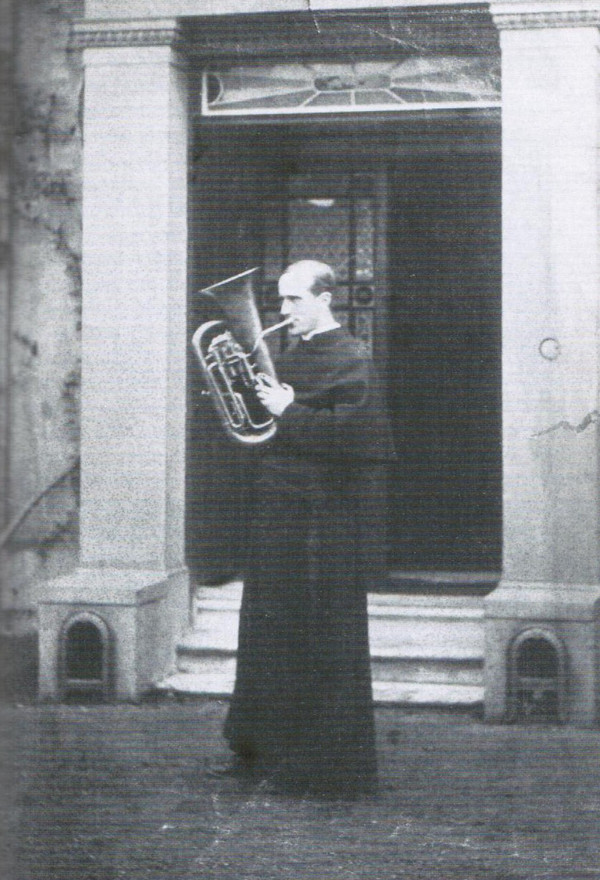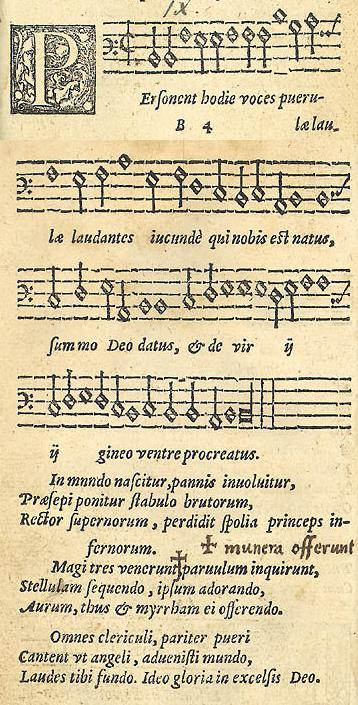|
Piae Cantiones
''Piae Cantiones ecclesiasticae et scholasticae veterum episcoporum'' (in English ''Pious ecclesiastical and school songs of the ancient bishops'') is a collection of late medieval Latin songs first published in 1582. It was compiled by Jacobus Finno, a clergyman who was headmaster of the Katedralskolan i Åbo, cathedral school at Turku. Publication was undertaken by Theodoricus Petri Rutha of Uusimaa, Nyland, who lived from about 1560 to about 1630.Robert Cummings, "Personent hodie" at [ allmusic], URL accessed January 4, 2009 He came from an aristocratic family in Finland, and was educated at University of Rostock, Rostock. The collection ''Piae Cantiones'' was published in Greifswald, duchy of Pomerania, Germany, and includes 74 Latin and Swedish/Latin songs that were sung at the time in Finnish cathedral schools, most notably in the Katedralskolan i Åbo, cathedral school at Turku. Most of them are religious in nature but some, for example ''Tempus adest floridum'', are secula ... [...More Info...] [...Related Items...] OR: [Wikipedia] [Google] [Baidu] |
Mensural Notation
Mensural notation is the musical notation system used for polyphony, polyphonic European vocal music from the late 13th century until the early 17th century. The term "mensural" refers to the ability of this system to describe precisely measured rhythmic durations in terms of numerical proportions amongst note values. Its modern name is derived from the terminology of medieval theorists, who used terms like ''musica mensurata'' ("measured music") or ''cantus mensurabilis'' ("measurable song") to refer to the rhythmically defined polyphonic music of their age, as opposed to ''musica plana'' or ''musica choralis'', i.e., Gregorian plainchant. Mensural notation was employed principally for compositions in the tradition of vocal polyphony, whereas plainchant retained its own, older system of neumes, neume notation throughout the period. Besides these, some solely instrumental music could be written in various forms of instrument-specific tablature notation. Mensural notation grew o ... [...More Info...] [...Related Items...] OR: [Wikipedia] [Google] [Baidu] |
John Rutter
Sir John Milford Rutter (born 24 September 1945) is an English composer, conductor, editor, arranger, and record producer, mainly of choral music. Biography Born on 24 September 1945 in London, the son of an industrial chemist and his wife, Rutter grew up living over the Globe pub on London's Marylebone Road. He was educated at Highgate School, where fellow pupils included John Tavener, Howard Shelley, Brian Chapple and Nicholas Snowman. As a chorister there, Rutter took part in the first (1963) recording of Britten's '' War Requiem'' under the composer's baton. He thence read music at Clare College, Cambridge, where he was a member of the choir. Whilst an undergraduate, he had his first compositions published, including the " Shepherd's Pipe Carol". He served as director of music at Clare College from 1975 to 1979, and led the choir to international prominence. In 1981, Rutter founded his own choir, the Cambridge Singers, which he conducts, and with which he has made ma ... [...More Info...] [...Related Items...] OR: [Wikipedia] [Google] [Baidu] |
Reginald Jacques
Thomas Reginald Jacques (13 January 1894 – 2 June 1969) was an English choral and orchestral conductor. His legacy includes various choral music arrangements, but he is not primarily remembered as a composer. Jacques was born in Ashby-de-la-Zouch, Leicestershire and obtained his first degree from the University of Oxford under Sir Hugh Allen, where he later became organist (1926) and fellow (1933) of Queen's College. Dr Jacques occupied a succession of increasingly prestigious and influential posts in the music world, based mostly in Oxford and London. He conducted the Oxford Harmonic Society between 1923 and 1930 and the Bach Choir from 1932 to 1960. He founded the Jacques String Orchestra in 1936. He became music director of the Council for the Encouragement of Music and the Arts (CEMA) at its inception in January 1940. Kathleen Ferrier was frequently a soloist under Jacques during that time, and performed her first London ''Messiah'' with him on 17 May 1943, an event ... [...More Info...] [...Related Items...] OR: [Wikipedia] [Google] [Baidu] |
David Willcocks
Sir David Valentine Willcocks, (30 December 1919 – 17 September 2015) was a British choral conductor, organist, composer and music administrator. He was particularly well known for his association with the Choir of King's College, Cambridge, which he directed from 1957 to 1974, making frequent broadcasts and recordings. Several of the descants and carol arrangements he wrote for the annual service of Nine Lessons and Carols were published in the series of books '' Carols for Choirs'' which he edited along with Reginald Jacques and John Rutter. He was also director of the Royal College of Music in London. During the Second World War (1939–1945) he served as an officer in the British Army, and was decorated with the Military Cross for his actions on Hill 112 during the Battle of Normandy in July 1944. His elder son, Jonathan Willcocks, is also a composer. Biography Born in Newquay in Cornwall, Willcocks began his musical training as a chorister at Westminster Abbe ... [...More Info...] [...Related Items...] OR: [Wikipedia] [Google] [Baidu] |
George Ratcliffe Woodward
George Ratcliffe Woodward (27 December 1848 – 3 March 1934) was an English Anglicanism, Anglican priest who wrote mostly religious verse, both original and translated from ancient authors. The best-known of these were written to fit traditional melodies, mainly of the Renaissance. He sometimes harmonised these melodies himself, but usually left this to his frequent collaborator, composer Charles Wood (composer), Charles Wood. Early life He was born at 26 Hamilton Square, Birkenhead, the son of George Ratcliffe Woodward, a merchant of Litherland, and his wife Ann De(a)ville Owen. The daughter of John Owen of Field House, Marchington, his mother had two clerical brothers, John Owen (chess player), John Owen and Robert Deaville Owen (1823–1904). Woodward was educated at Elstree School, then Harrow School. In 1867 he won a Sayer Scholarship to Gonville and Caius College, Cambridge. He graduated in 1872, with a third-class degree, third class in the Classics Tripos. Influence ... [...More Info...] [...Related Items...] OR: [Wikipedia] [Google] [Baidu] |
Plainsong And Medieval Music Society
The Plainsong and Medieval Music Society (PMMS), also spelled as the Plainsong and Mediæval Music Society, is an English music society. Founded in 1888, the PMMS primarily researches, promotes and produces publications on medieval music, particularly the liturgical chant from that time to the present. A registered charity since 1987, it has been particularly influential in encouraging the revival of Anglican chant. Musicologists associated with the PMMS include H. B. Briggs, Anselm Hughes, G. H. Palmer, and George Ratcliffe Woodward, and more recently Gustave Reese, D. H. Turner, John Stevens, Christopher Page and Margaret Bent. The society is best known for its publications, which number over a hundred; most of them are either essays on, or editions of, plainchant. Through Cambridge University Press, it publishes the journal '' Plainsong and Medieval Music'' twice a year, previously known as the ''Journal of the Plainsong & Mediaeval Music Society''. History The Plainso ... [...More Info...] [...Related Items...] OR: [Wikipedia] [Google] [Baidu] |
Gaudete
''Gaudete'' ( or , ; "rejoice ye">wikt:ye">ye/nowiki>" in Latin) is a sacred Christmas carol, thought to have been composed in the 16th century. It was published in ''Piae Cantiones'', a collection of Finnish/Swedish sacred songs published in 1582 in the North German city of Greifswald. No music is given for the verses, but the standard tune comes from older liturgical books. There is a known entry from around 1420 in the Hussite Jistebnice hymnal (Jistebnický kancionál). The Latin text is a typical medieval song of praise, which follows the standard pattern for the time – a uniform series of four-line stanzas, each preceded by a two-line refrain (in the early English carol this was known as the '' burden''). Carols could be on any subject, but typically they were about the Virgin Mary, the Saints or Yuletide themes. Text The complete text of "", including the refrain: Recordings 1970s * British folk rock group Steeleye Span had a hit in 1973 (No. 14, UK sing ... [...More Info...] [...Related Items...] OR: [Wikipedia] [Google] [Baidu] |
Of The Father's Heart Begotten
"Of the Father's heart begotten" alternatively known as "Of the Father's love begotten" is a doctrinal hymn based on the Latin poem "Corde natus" by the Roman poet Prudentius, Aurelius Prudentius, from his ''Liber Cathemerinon'' (hymn no. IX) beginning "Da puer plectrum" which includes the Latin stanzas listed below. History The ancient poem was translated and paired with a medieval plainchant melody "Divinum mysterium". "Divinum mysterium" was a "Sanctus Trope (music)#Medieval music, trope" – an ancient plainchant melody which over the years had been musically embellished.Raymond F. Glover, ''The Hymnal 1982 Companion: Service Music and Biographies'', Volume 2 (Church Publishing, Inc., 1994), pp. 81–83 An early version of this chant appears in manuscript form as early as the 10th century, although without the melodic additions, and "trope" versions with various melodic differences appear in Italian, German, Gallacian, Bohemian and Spanish manuscripts dating from the 13th to ... [...More Info...] [...Related Items...] OR: [Wikipedia] [Google] [Baidu] |
Prudentius
Aurelius Prudentius Clemens () was a Roman Christian poet, born in the Roman province of Tarraconensis (now Northern Spain) in 348.H. J. Rose, ''A Handbook of Classical Literature'' (1967) p. 508 He probably died in the Iberian Peninsula some time after 405, possibly around 413. The place of his birth is uncertain, but it may have been Caesaraugusta ( Saragossa), Tarraco ( Tarragona), or Calagurris ( Calahorra). Life Prudentius practiced law with some success, and was twice provincial governor, perhaps in his native country, before the emperor Theodosius I summoned him to court. Towards the end of his life (possibly around 392) Prudentius retired from public life to become an ascetic, fasting until evening and abstaining entirely from animal food; and writing poems, hymns, and controversial works in defence of Christianity. Prudentius later collected the Christian poems written during this period and added a preface, which he himself dated 405. Poetry The poetry of Prudentius ... [...More Info...] [...Related Items...] OR: [Wikipedia] [Google] [Baidu] |
Personent Hodie
"Personent hodie" is a Christmas carol originally published in the 1582 Finnish song book ''Piae Cantiones'', a volume of 74 Medieval songs with Latin texts collected by Jacobus Finno (Jaakko Suomalainen), a Swedish Lutheran cleric, and published by T.P. Rutha. The song book had its origins in the libraries of cathedral song schools, whose repertory had strong links with medieval Prague, where clerical students from Finland and Sweden had studied for generations. A melody found in a 1360 manuscript from the nearby Bavarian city of Moosburg in Germany is highly similar, and it is from this manuscript that the song is usually dated."On This Day Earth Shall Ring" ahymnsandcarolsofchristmas.com URL accessed 4 January 2009 Textual origins The Latin text is probably a musical parody of an earlier 12th century song beginning "", written in honour of Saint Nicholas, the patron saint of Russia, sailors and children – to whom he traditionally brings gifts on his feast day, 6 December ... [...More Info...] [...Related Items...] OR: [Wikipedia] [Google] [Baidu] |



